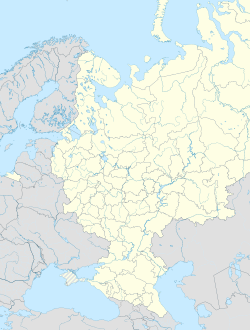Gorkovsky (Volgograd)
| district
Gorkowski
Горьковский
|
||||||||||||||||||||||||||
|
||||||||||||||||||||||||||
|
||||||||||||||||||||||||||
Gorkowski ( Russian Го́рьковский ) is a district of Volgograd and a former urban-type settlement in the Volgograd Oblast ( Russia ) with 16,436 inhabitants (calculation 2009, before incorporation).
geography
The settlement is located in the southeast of the European part of Russia, about 10 kilometers from the right bank of the Volga .
Gorkowski belongs to the Sovetsky district of the city or the Volgograd district and is located about 15 kilometers southwest of the city center.
history
The history of the settlement begins in 1774 with the establishment of a village on land that was given to the then commander of the Tsaritsyn fortress (now the city of Volgograd) Ivan Zypletjow, and which he named after his son Alexei Alexejewka , who died in childhood . Later, the village, whose population remained below 100 for a long time, was also known as Voroponowka after a later owner or Krutenkaya , from Russian kruto for steep , based on the relatively steep ascent from the Volga to the village, in different spellings.
In 1862 the Don Railway , which connected Tsaritsyn on the Volga with Kalach on the Don , one of the first railway lines in southern Russia, was passed and the Krutaya station opened. At the station, which was at the apex of the line sloping from there in the direction of the Volga and Don , a depot , workshops and a correspondingly large station settlement were built in the period that followed. After the extension of the railway line by more than 300 kilometers to the Lichaya station (between the present-day cities of Kamensk-Shakhtinsky and Swerevo ), from where there was a connection to Rostov-on-Don and the Donets Basin , the station was renamed Voroponowo in 1904 .
During the Second World War , the station and settlement were badly affected during the Battle of Stalingrad , as Tsaritsyn was now called, between late summer 1942 and early 1943. In 1954, the restored train station was renamed imeni Maxima Gorkowo ("Maxim Gorki Station") in honor of Maxim Gorky , who worked there around 1889 before he became famous as a writer. In 1957 the place was given the status of an urban-type settlement under its current name, also derived from Gorky , which was subordinated to the administration of the Volgograd city district Sovetsky.
In March 2009, Gorkowski, like the village (selo) Pestschanka , three kilometers to the south, which was previously administratively subordinate to the settlement , was incorporated into Volgograd and is now part of the sovetsky district as a settlement (Possjolok) Gorkowski district.
In the village Peschanka Austria and was established in 1996 by the Republic of Austrian Black Cross , the Memorial in Peschanka built.
Population development
| year | Residents |
|---|---|
| 1959 | 4,658 |
| 1970 | 8,404 |
| 1979 | 9,268 |
| 1989 | 9,610 |
| 2002 | 15,281 |
| 2009 | 16,436 |
Note: 1959-2002 census data
Economy and Infrastructure
Today Gorkowski is a residential and industrial suburb of Volgograd, to which there is a city bus connection. There are companies in the food and construction industries, as well as various utilities. The "military town" of a division of the Russian army stationed there also belongs to Gorkovsky .
On the railway line Lichaja - Volgograd (station name im. Maxima Gorkowo , "Maxim-Gorki-Station"; route km 366), which is crossed there by the western Volgograd freight bypass ( Gumrak - Kanalnaja) created after the Second World War , there is a near Gorkowski large marshalling yard . The M21 trunk road , which connects Volgograd with Donetsk on the Ukrainian border, runs through the settlement .
Individual evidence
- ↑ L. Dediščeva: Posëlok Gor ʹ kovskij - tvoja istorija (1774–2009 gg.) . Volgograd 2009 (Russian; Gorkovsky settlement - your story (1774–2009) ).
- ^ A b A. Archangelʹskij, V. Archangelʹskij: Želesnodorožnye stancii SSSR . tape II . Transport, Moscow 1981, p. 264 (Russian; USSR railway stations ).
- ↑ Order No. 20/652 of the Volgograd Oblast Duma of March 11, 2009 (Russian)
- ↑ Aleksandr Vorobʹëv: Ot Ėl ʹ tona do Urjupinska: poselenija Volgogradskoj oblasti . Stanica-2, Volgograd 2004, ISBN 5-93567-013-5 ( From Lake Elton to Urjupinsk: Settlements of the Volgograd Oblast ; Russian).

